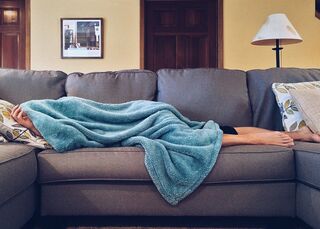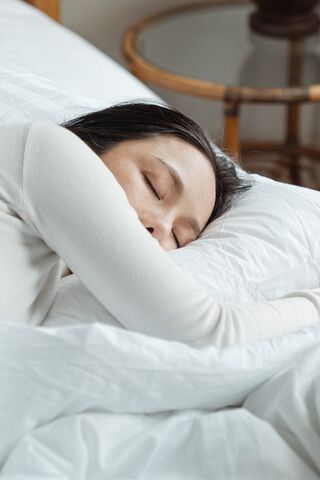Sleep
Rest Assured
Sleep expert Dr. Taryn Weinkam gives guidance to help patients sleep easier.
Posted January 10, 2021
Any therapist with a patient who looks like Al Pacino in Insomnia will testify to the challenges of working with the sleep-deprived. Such a severe case probably needs more than psychotherapy. For the rest, Dr. Taryn Weinkam, a sleep specialist in the San Francisco Bay Area, suggests most therapists may be more capable of helping insomniacs than they think.

If the person doesn't have a medical problem or substance use issue, including caffeine, contributing to the sleep deprivation, Dr. Weinkam urges therapists to implement components of cognitive behavioral therapy for insomnia (CBT-I). She notes that many therapists may not feel confident in pointedly addressing insomnia if they haven't had formal training on it.
Their sleep-deprived patients are suffering and want relief. The pressure may make it seem that the best idea is a quick trip to the psychiatrist for a medication review. However, she explained hypnotic medications can backfire with rebound effects, meaning the patient's sleep is actually worse than ever after the prescription runs out. It's an unfortunate example of iatrogenic illness when a little CBT-I can often do the job. Still, other patients are not interested in medications and plead for less invasive interventions.
What's a non-sleep expert to do?
First, says, Dr. Weinkam, "If you're not used to working on insomnia with people, simply providing a bulleted handout about sleep hygiene, without assessing their issues or providing additional information, can feel dismissive or unhelpful. Chances are they've considered it already."
"Work with them," she continued. "Begin with a discussion about lifestyle and sleep habits. You know, no caffeine six hours before bed, avoid heavy exercise close to bedtime, make sure there is a wind-down period. Additionally, avoid naps; if needed, keep them to 30 minutes, and use an alarm." It could just be a simple matter of working out a better routine or making a few behavioral adjustments."
Next, Dr. Weinkam advises, evaluate. "I don't make sweeping assumptions about 'I'm not getting enough sleep.' What's that mean to the individual?" She continued, "Some people hear, 'You need eight hours of solid sleep' and feel stressed because they're only getting six and a half, or awake a couple of times in the night, and feel that's somehow wrong."
Instead of falling prey to the 8-hour rule with their patient, therapists would do well to provide some psycho-education and validate their distress. "Normalizing that people have different sleep needs, just like many people need more or less than 2000 calories a day to optimally function, is a good place to start," says Dr. Weinkam. One way to help objectify experience is assessing "excessive daytime sleepiness," as the sleep-deprived are often fatigued during the day. The questionnaire she finds most helpful is the Epworth Sleepiness Scale.

Third, meet them where they're at. "What is disturbing their sleep?" asks Dr. Weinkam. "For example, if they're sleeping on a couch in a noisy environment for some reason, or their work email is going off at night, that's probably problematic." It would be helpful to brainstorm with them on how to make their environment more comfortable. Perhaps something as easy as trying white noise or turning off notifications."
Fourth, "One’s bedtime routine affects sleep, so if the hour before bed is full of activating activities, then it may be difficult to fall asleep.” Sleep is part of a routine, and if the routine leading up to bed is activating, just because you're in bed, and it feels comfortable, doesn't mean you'll fall asleep," says Dr. Weinkam." They've probably figured out that having coffee after dinner is a bad idea, but so is watching the evening news, adrenaline-laced movies, and endlessly thumbing through social media." It’s not only exposure to screen time or its brightness, but screen content that gets in the way she underscored. Also, people can’t expect to just dive into bed and fall asleep.

Dr. Weinkam explained, "If you’ve been running 60-miles-per-hour all day, you have to gradually hit the brakes before reaching zero. If not, watching caffeine and keeping away from the news is worthless because it’s now an expectation you won’t get rest. We don’t just turn off, like switches.” She specified that we need at least a half-hour to an hour of unwinding, noting, “I like to teach people to get into a relaxing bedtime routine for this.” She continued that she teaches progressive muscle relaxation and diaphragmatic breathing to show people who feel they have no control oversleep that they have control over relaxing, which is necessary for sleep.
Lastly, "Is the insomnia driven by worry or rumination?" asks Dr. Weinkam. "Think about it. Our daytime can be filled with distractions that may be diverting us from worries and difficult emotions, but in the middle of the night, when we aren’t able to sleep, those thoughts and feelings have center stage. All the sleep hygiene in the world does not resolve anxiety or depression." She suggested that the patient be educated on how thoughts affect insomnia, and to work pointedly on controlling the pervasive thought process behind the insomnia.
Dr. Weinkam finished by recommending that if you encounter patients with insomnia on a frequent basis, it is a good idea to get trained in formal CBT-I, offered through some continuing education establishments. She also noted two books that practitioners may find helpful:
- Cognitive Behavioral Treatment of Insomnia: A Session-by-Session Guide by Michael L. Perlis, et al.
- Treatment Plans and Interventions for Insomnia: A Case Formulation Approach (Treatment Plans and Interventions for Evidence-Based Psychotherapy) by Rachel Manber and Colleen E. Carney




